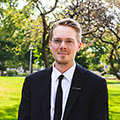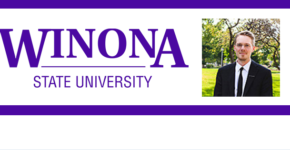 Who has the power?
Who has the power?
Adam Gaffey, assistant professor of communication studies at Winona State University, determines this question in terms of rhetorical agency.
I joined the faculty at Winona State University in fall 2016. Professional and educational prospects led me to New York, Texas, and South Dakota, but I’m very glad to once again call Minnesota home. When not teaching classes or writing, I enjoy taking in the scenery afforded by living in Bluff Country, trying my hand at amateur photography, and strumming a ukulele to my family’s amusement. Though the organization has disbanded, I remain a card-carrying member of the Corduroy Appreciation Club.
Rhetorical Agency
Though it often invokes images of bureaucratic bodies at work, or a well-paid athlete mulling a franchise move, agency is a concept happily at home in the craft of rhetoric.
Rhetoric is about relationships of influence, or how symbols—words being the most common—are used to create, sustain, and alter the character of such relationships. Many forms of communication become the site of this agency when audiences (or receivers of a message) and speakers (or creators of a message) engage in a transactional process of attention or influence. This seems to be the point of liberal arts education. Any course on public speaking, persuasive writing, or critical thinking has agency as its end goal—teaching how words empower, and how such power is exercised in a diverse range of human interactions.
Conventional authors are not the only ones empowered by agency, and neither are formal communication encounters the only sites where this empowerment is demonstrated. Consider how Confederate monuments have increasingly become sites of deliberation and protest. Past architects and designers honed selective features of the past, and raised them—literally—for public display. But many past and many more present-day citizens are demonstrating their agency by publicly reassessing the moral relevance of such structures in contemporary landscapes. Whether these structures are maintained, altered, or removed, this dynamic between past authors and present audiences makes plain the process by which rhetorical agency is both exercised by some and confirmed (or denied) by others.
Who has power? If we consider the power of persuasion, and the public struggle of meaning persuasion implies, the answer to this question resides in the practice and study of rhetorical agency.

Comments
One response to “Adam Gaffey, Winona State University – Rhetorical Agency”